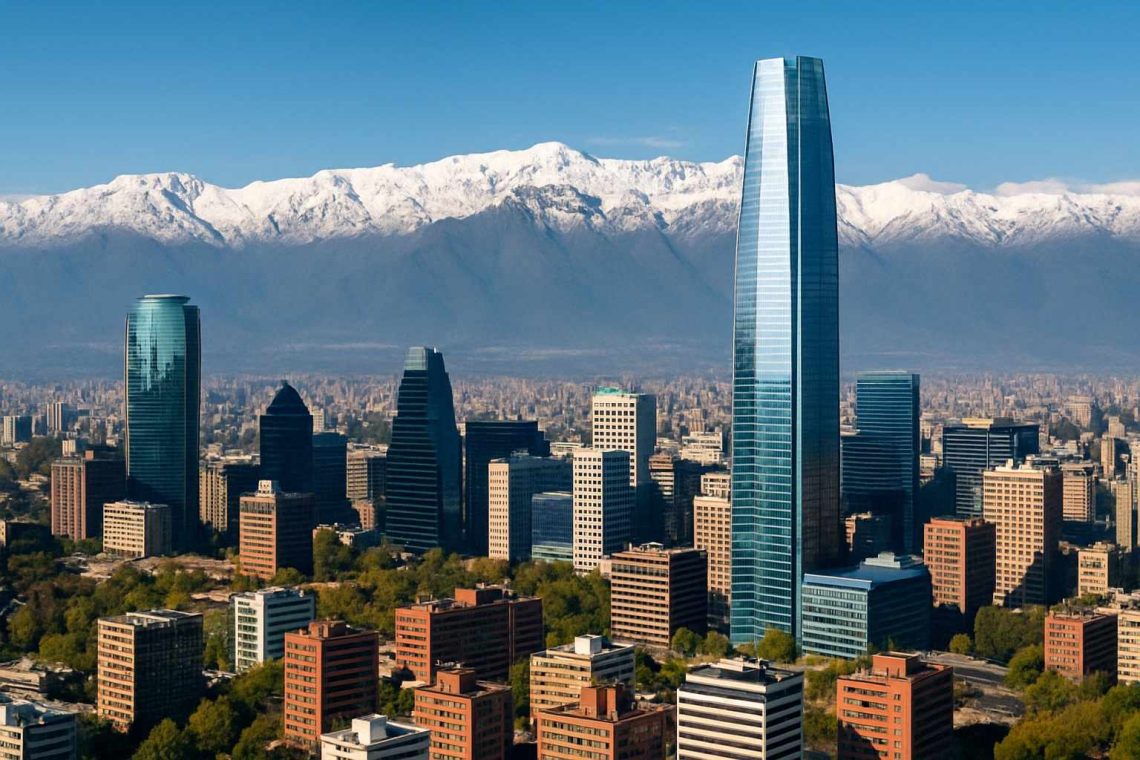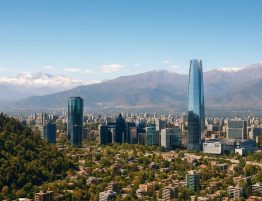
Economic Overview
Chile has a relatively small population compared to its Latin American competitors, yet it stands out as one of the most open economies in the region. The country is characterised by a strong pro-business environment driven by stable macroeconomic policies, a robust banking system and investor-friendly regulations.
Chile has various free trade agreements with major economies such as the United States and other Latin American countries, reflecting Chile´s openness to global trade and making it a conducive environment to investment.
It plays an important role in the mining industry, being one of the world’s leading copper producers, producing around 28% of global copper and exporters of lithium.
Political Overview
As one of Latin America’s most politically stable countries, The President of the Republic and local officials are democratically elected. The country follows a presidential system alongside check and balances, providing a transparent and stable political environment for long-term investments.
Chile has a clear legal and regulatory framework, including:
DL 600 which guarantees equal treatment for foreign investors.
Foreign Investment Promotion Law simplifies investment procedures and allows free transfer of capital.
Bilateral Investment Treaties with major economies to protect investor’s rights.
Social support for the government remains strong, with any protests and social movements being handled within the democratic system.
Social Overview
Chile boasts several, renowned colleges and one of the highest rates of education in Latin America. Because of these factors as well as state and private educational and vocational training programs, Chile is able to provide professionals and specialized labor at affordable prices.
The country’s education system is regarded as one of the highest in Latin America, with a clear focus on scientific and technical disciplines, both of which are the backbone to the mining, manufacturing and technology sectors. Chilean universities are recognised internationally, producing a highly educated workforce.
Chile is also recognised as one of Latin America´s most technologically advanced countries. With a growing number of start-ups, the government actively promotes digitalisation across various sectors.
Climate Diversity
Chile’s highly diverse climate, ranging from the driest desert in the world to glacial regions creates unique investment opportunities year-round in agriculture, tourism and mining. For example, the Atacama Desert in the North attracts investors in Solar Energy & Mining since the dry climate reduces infrastructure maintenance costs. In contrast, the southern region creates opportunities for foreign investment in tourism. More niche areas including wine tourism (in the central valleys, in close proximity to Santiago) are on the rise.
Chile’s unique ecosystems also provide opportunities for pharmaceutical and agricultural biotech innovations. Biotechnology Law encourages research of biotech products with financial benefits. The Economic Development Agency offers grants and tax incentives for biotech startups projects.
Why Work with a Boutique Chilean Law Firm?
Unlike large international firms, boutique law firms such as Becker Abogados offer personalized, efficient, and highly specialized legal support for foreign investors. Our in-depth knowledge of Chile’s legal landscape, combined with hands-on support throughout every stage of your investment journey, makes us a trusted legal ally. We understand the needs of small and medium investors and provide tailored strategies that maximize returns while mitigating legal and tax risks. Whether you are incorporating a company, acquiring real estate, or launching a new venture in Chile, Becker Abogados ensures transparency, agility, and world-class service.
Foreign Investment Protection and Business Incorporation in Chile
Thanks to Law No. 20,848, foreign investors in Chile enjoy full protection by international, bilateral, and multilateral treaties, granting them the same treatment as Chilean investors. This ensures the right to economic freedom and protection against arbitrary discrimination. Under this law, a foreign investor is defined as an individual or legal entity who does not reside or have a domicile in Chile.
The process of incorporating a company has been significantly simplified through the implementation of the “Tu Empresa en un Día” (Your Company in a Day) platform, which reduces the time and costs previously associated with company formation. However, this method presents certain limitations. Some businesses perceive it as less professional, particularly when compared to companies formed through traditional notarized deeds.
The platform also offers limited flexibility, as it relies on standard templates that may not accommodate specific legal needs. Additionally, unless all partners possess an advanced electronic signature, notarial intervention is still required—potentially adding delays and expenses. Therefore, while this system may be suitable for simple business structures, companies seeking customized legal frameworks or a higher degree of formality may prefer traditional incorporation methods.
In general, companies must be established by public deed, a legal and public document granted by a notary.
It is important to note that the most common company structures used for foreign investment include:
Sociedad Anónima (SA): (Corporation)
Ownership is divided into shares that can be bought and sold.
Commonly used by large or medium-sized companies seeking to raise capital through the stock market.
Managed by a board of directors and typically has an executive director.
Shareholders are not personally liable for the company’s debts beyond their investment in shares.
Sociedad de Responsabilidad Limitada (SRL): (Limited Liability Company, Ltda.)
Ownership is divided among a limited number of partners.
Liability of each partner is limited to their investment in the company.
Typically used by small to medium-sized businesses.
Profits and losses are shared in accordance with the agreement among partners.
Sociedad por Acciones (SPA): (Stock Corporation)
Ownership is divided into shares that can be bought and sold.
Offers flexibility in management as it can be organised with or without a board of directors.
Allows for easier transfer of shares among shareholders.
Sociedad Colectiva (General Partnership)
All partners are jointly liable for the company’s debts.
Not a separate legal entity from its partners. The business does not have its own legal standing but is directly tied to the personal identity of the partners.
Empresa Individual de Responsabilidad Limitada (Individual Limited Liability Company)
Owned and operated by an individual, there is no need for additional partners or shareholders.
The owner’s liability is limited to the capital invested in the business, meaning personal assets are protected from any business debts.
Legal protection for foreign investors:
Under Law No. 20,848, investors can engage in any lawful economic activity without arbitrary restrictions.
Chile upholds a fair legal system that prevents discriminatory practices.
Since 1990, Chilean courts recognise dispute resolution by way of foreign arbitration and a mechanism has been put in place for arbitration to settle disputes within foreign investment.
Infrastructure and Innovation
Chile is characterised by its well-developed infrastructure and its investment in education and innovation.
Transportation Infrastructure
Chile’s Pan-American Highway runs through the country all the way to Canada, allowing the smooth distribution of goods and materials.
Santiago’s Arturo Merino Benítez International Airport offers direct flights to many business hubs, improving supply chain efficiency. It is also important to note that Chile’s time zone is convenient for doing business with Europe and the US in the morning and Asia in the late afternoon.
Energy Infrastructure
Over 60% of Chile’s electricity comes from renewable sources, reducing long-term energy costs and ensuring sustainable operations for foreign businesses.
Investors in solar and wind projects benefit from tax breaks and subsidies, making Chile an attractive destination for energy-sector investments.
Quality of Telecommunication
High Internet Penetration & Connectivity
Chile has one of the highest internet penetration rates in Latin America, with over 90% of the population having access to the internet.
Broadband speeds are among the fastest in the region.
5G and Mobile Network Leadership
Chile was the first country in Latin America to launch 5G, providing high-speed mobile internet for businesses.
4G/LTE coverage exceeds 95%, allowing seamless communication for international investors.
Digital Infrastructure & Data Centers
Santiago is a hub for data centers, with major global firms investing in digital storage.
Government backed digital initiatives promote investment in cybersecurity and AI-driven businesses.
Telecom Regulations
Chile’s telecommunications sector has no restrictions on ownership, making it open to foreign investment.
Technology and Innovation Initiatives
Chile is focused on leveraging technology and innovation to drive economic growth and development. The country is making strides in various areas, from hosting international technology summits to fostering a thriving startup ecosystem and prioritizing digital transformation.
Singularity Summit Chile
Chile is at the forefront of technological discussions, demonstrated by events like the Singularity Summit Chile. This summit brings together leaders and innovators to discuss the potential of technologies like artificial intelligence (AI), longevity, and the metaverse. The summit aims to bridge the gap between technology and the market, promoting the use of technology to drive equitable growth in Chile and the wider region.
Chilean Tech Companies
Chile is also home to successful tech companies making a global impact. Chucao Tech, for example, develops technologies for various sectors, including aquaculture, agriculture, and mining. These innovations are being exported and used internationally, highlighting Chile’s growing contribution to the global technology landscape.
Cybersecurity as a Strategic Priority
Chile recognizes the importance of cybersecurity in today’s digital world. The country has made it a strategic priority to strengthen its cybersecurity defenses and protect its digital infrastructure. This commitment is crucial for fostering a safe and secure environment for businesses and investments.
Digital Transformation of the Public Sector
The Chilean government is actively promoting the digital transformation of the public sector. This effort aims to modernize government services, improve efficiency, and increase transparency. By embracing digital technologies, Chile is working to create a more streamlined and citizen-friendly public sector.
Stable Macroeconomic Environment
Unlike other South American countries, Chile has maintained a consistent level of economic growth and low inflation, making it a safe haven for business. With its GDP having seen steady growth in recent years, it is expected to reach 340.90 USD Billion by the end of 2025. The country’s prudent fiscal policies and strong banking system contribute to a stable macroeconomic environment that attracts foreign investors:
Updated Economic Outlook (March 2025)
According to the Central Bank’s March 2025 Monetary Policy Report (IPoM), Chile’s GDP grew by 2.6% in 2024, exceeding previous projections. This performance was driven by strong external demand, particularly in agriculture and wholesale trade, and a notable increase in foreign tourism. These factors also strengthened Chile’s current account, which recorded a moderate deficit of 1.5% of GDP in 2024.
The growth forecast for 2025 has been revised upwards to a range of 1.75% to 2.75%, reflecting a more dynamic domestic economy and improved business sentiment. Private consumption and gross fixed capital formation also expanded in late 2024, supported by stronger labor market indicators and rising real wages.
Chile’s inflation rate stood at 4.7% annually in February 2025, driven in part by energy prices and currency depreciation. However, core inflation (excluding volatile items) remained around 4%, and the Central Bank continues to project a convergence to the 3% target by early 2026.
This data confirms Chile’s ability to sustain stable, long-term economic growth, bolstered by healthy exports, rising investment, and a clear monetary policy framework focused on transparency and inflation control—factors that enhance its appeal to international investors.
In addition to its consistent fiscal discipline and inflation control, Chile’s macroeconomic strategy has demonstrated resilience in times of global uncertainty. The country maintains one of the lowest public debt ratios in Latin America and holds robust international reserves, ensuring the government’s ability to respond to external shocks.
The Central Bank of Chile is autonomous and committed to inflation targeting, contributing to low and predictable interest rates—key factors that reduce investment risk. Furthermore, international credit rating agencies have consistently ranked Chile as one of the safest economies in the region, reinforcing its reputation as a secure destination for long-term investment.
Over the past three decades, Chile has maintained one of the most stable macroeconomic environments in Latin America. A robust inflation-targeting policy (3% goal) and a free-floating exchange rate regime have enabled monetary credibility and resilience to global shocks. During the 2007–09 financial crisis and the COVID-19 pandemic, Chile’s financial system proved its robustness through prudent fiscal discipline and strong institutional responses. The recent monetary policy approach—calibrated to achieve forward-looking inflation targets—has delivered consistent results, with average inflation at 3.2% over two decades (BIS, 2020).
Key Areas for Investment
Mining and Minerals
Aside from being the world’s largest copper producer, Chile has enormous reserves of other minerals: lithium, gold, silver, and iron. Major international mining firms operate in the north of Chile, with vast opportunities in mining services and technology. It is important to note that Chile’s low political risk makes investing in mining comparatively safer than in many other resource-rich regions. The lithium sector is also on the rise, with Chile being part of the ‘Lithium Triangle’; controlling most of the world’s lithium reserves. In particular, Chile’s lithium extraction, primarily from brine deposits in the Atacama Desert, offers significant cost advantages for investors. This is due to factors such as the region’s high solar radiation and arid climate, which facilitate efficient evaporation processes.
Energy (Renewables and Power)
The country’s geography provides ideal conditions for investment in solar energy, most notably in the Atacama Desert which has some of the highest solar irradiance on Earth. These investments benefit from power purchase agreements and government support for non-conventional renewable energy. Chile has also become a hotspot for green hydrogen, with Chile’s renewable energy capacity putting it in the perfect position to do so.
Agribusiness and Food Exports
Chile’s varied climate, ranging from the desert north to Mediterranean central valleys to the rainy south, allows the country to be a global agricultural powerhouse. Chile is one of the world’s top wine exporters and the second largest salmon producer in the world, drawing investor interest due to rises in global demand.
Infrastructure and Public Concessions
With the government’s commitment to upgrading infrastructure, there are new projects in urban transport and logistics that provide steady returns backed by the state’s concession agreements.
Technology and Global Services
Chile was put on the map for entrepreneurship as a result of the government’s Start-Up Chile program. With opportunities in software and increasingly in AI, investors are increasingly finding potential in the country’s tech and services hub. Global service centers are also drawn to Chile for the country’s political stability and educated workforce.
Tourism and Hospitality
Adventure and eco-tourism in particular, have seen strong growth in recent years. Destinations such as Torres del Paine and the Atacama Desert have become iconic destinations that can yield good returns. A growing middle class also means a strong demand for domestic tourism, offering lucrative opportunities for foreign investors.









